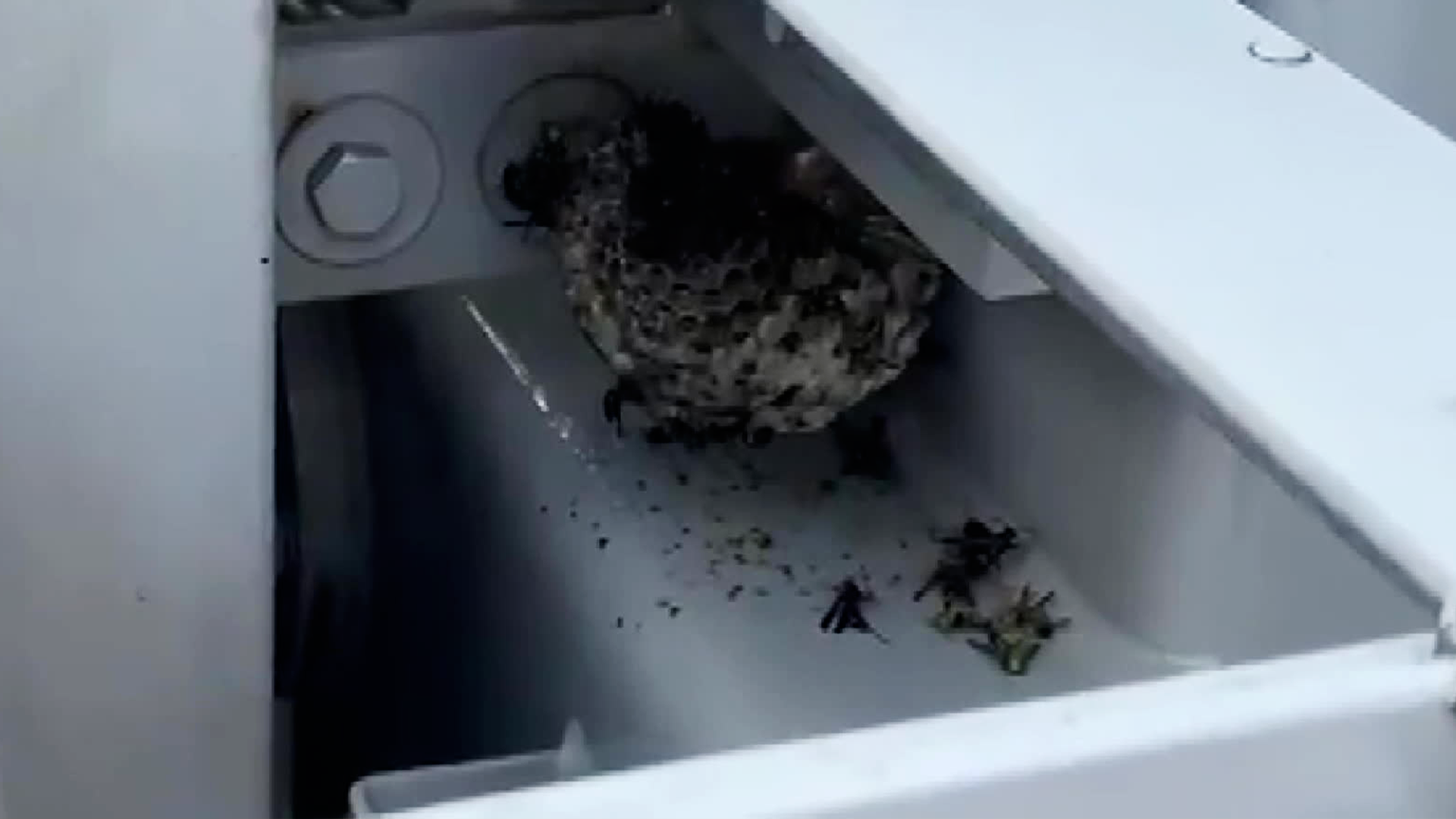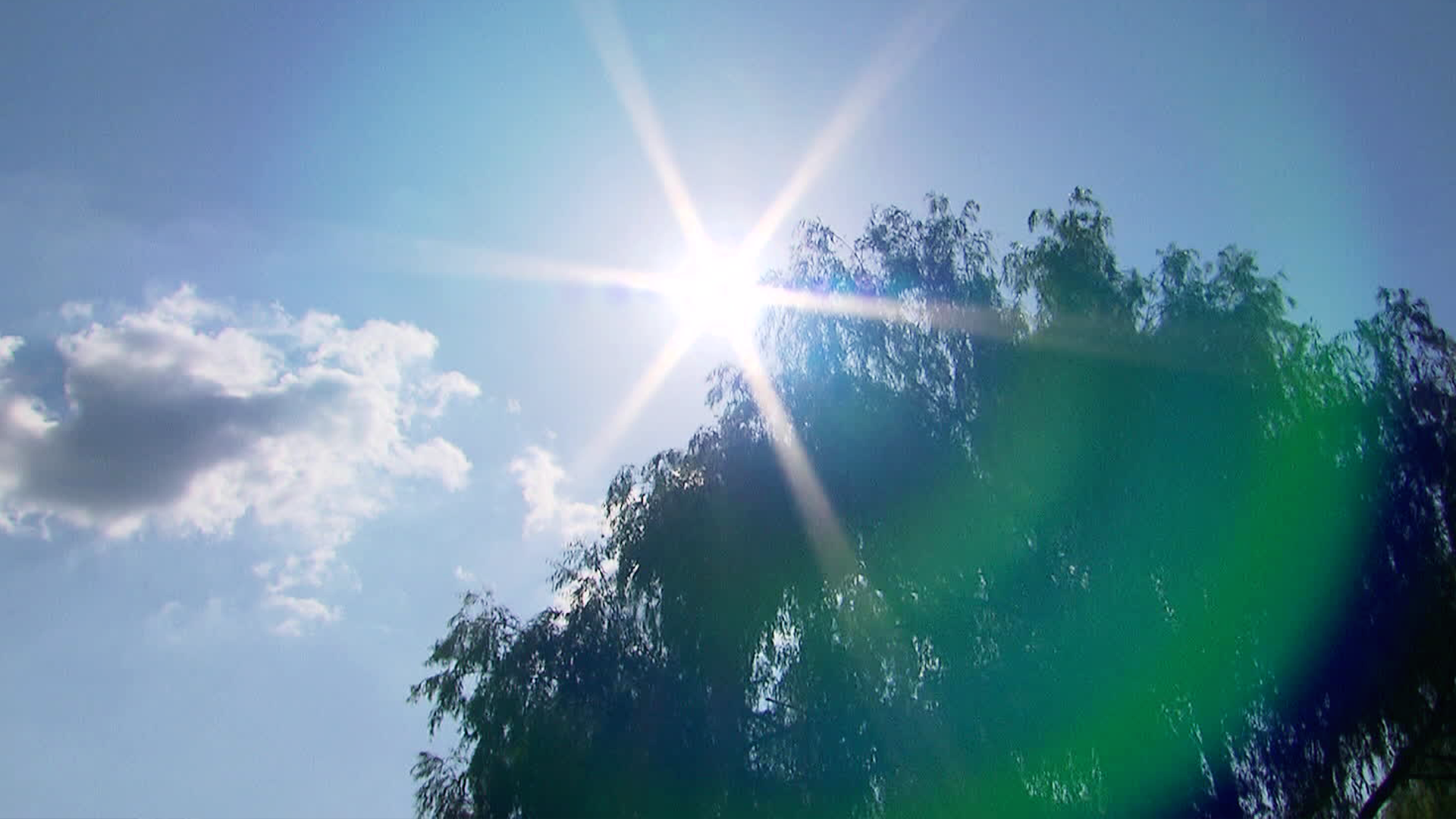[Anchor]
In August, you need to be cautious of bees.
Even though it can be exhausting in this heat, this is actually the time when bee sting incidents are rapidly increasing due to their heightened activity.
Due to unusual weather, the range of bee activity has also expanded, but there are ways to reduce the damage.
Reporter Min Soo-ah will explain.
[Report]
A residential balcony in Yeongdong, Chungbuk.
A beehive the size of an adult's fist is attached to the door frame.
A firefighter in protective gear carefully approaches and removes the beehive.
["You have to hold it tight! (Twist the bag) around and around!"]
Firefighters spray water towards the tree with the beehive.
A beehive was also found at a nearby transformer facility, and chemicals are being sprayed.
Four beehives were found in this factory alone.
[Kim Tae-ki/Chungbuk Eumseong Fire Station Geumwang 119 Safety Center: "There was one hornet's nest the size of a soccer ball and three paper wasp nests the size of a palm."]
As the high temperatures of summer increase bee activity, related reports are also on the rise.
The number of 119 calls requesting beehive removal increased from about 190,000 in 2022 to 300,000 last year, a nearly 60% increase in three years.
In particular, one-third of the annual reports are concentrated in the month of August.
Bee sting incidents also significantly increase in summer.
Last year, bee stings began to rise as the weather warmed, exceeding 2,000 cases in July and August, before decreasing again in September.
Experts advise to be especially cautious from late August to early September when bee activity is high and the number of visitors to graves increases.
[Jeong Cheol-ui/Professor, Department of Bioengineering, Gyeongkuk National University: "(In extreme heat) the breeding behavior decreases. As the weather cools down, after mid-August, they start breeding again and engage in feeding activities a lot."]
The fire authorities emphasized that when going outdoors, one should avoid strong-scented cosmetics and report any discovered beehives immediately to 119.
This is KBS News, Min Soo-ah.
In August, you need to be cautious of bees.
Even though it can be exhausting in this heat, this is actually the time when bee sting incidents are rapidly increasing due to their heightened activity.
Due to unusual weather, the range of bee activity has also expanded, but there are ways to reduce the damage.
Reporter Min Soo-ah will explain.
[Report]
A residential balcony in Yeongdong, Chungbuk.
A beehive the size of an adult's fist is attached to the door frame.
A firefighter in protective gear carefully approaches and removes the beehive.
["You have to hold it tight! (Twist the bag) around and around!"]
Firefighters spray water towards the tree with the beehive.
A beehive was also found at a nearby transformer facility, and chemicals are being sprayed.
Four beehives were found in this factory alone.
[Kim Tae-ki/Chungbuk Eumseong Fire Station Geumwang 119 Safety Center: "There was one hornet's nest the size of a soccer ball and three paper wasp nests the size of a palm."]
As the high temperatures of summer increase bee activity, related reports are also on the rise.
The number of 119 calls requesting beehive removal increased from about 190,000 in 2022 to 300,000 last year, a nearly 60% increase in three years.
In particular, one-third of the annual reports are concentrated in the month of August.
Bee sting incidents also significantly increase in summer.
Last year, bee stings began to rise as the weather warmed, exceeding 2,000 cases in July and August, before decreasing again in September.
Experts advise to be especially cautious from late August to early September when bee activity is high and the number of visitors to graves increases.
[Jeong Cheol-ui/Professor, Department of Bioengineering, Gyeongkuk National University: "(In extreme heat) the breeding behavior decreases. As the weather cools down, after mid-August, they start breeding again and engage in feeding activities a lot."]
The fire authorities emphasized that when going outdoors, one should avoid strong-scented cosmetics and report any discovered beehives immediately to 119.
This is KBS News, Min Soo-ah.
■ 제보하기
▷ 카카오톡 : 'KBS제보' 검색, 채널 추가
▷ 전화 : 02-781-1234, 4444
▷ 이메일 : kbs1234@kbs.co.kr
▷ 유튜브, 네이버, 카카오에서도 KBS뉴스를 구독해주세요!
- Bee stings rise in August
-
- 입력 2025-08-18 00:26:46

[Anchor]
In August, you need to be cautious of bees.
Even though it can be exhausting in this heat, this is actually the time when bee sting incidents are rapidly increasing due to their heightened activity.
Due to unusual weather, the range of bee activity has also expanded, but there are ways to reduce the damage.
Reporter Min Soo-ah will explain.
[Report]
A residential balcony in Yeongdong, Chungbuk.
A beehive the size of an adult's fist is attached to the door frame.
A firefighter in protective gear carefully approaches and removes the beehive.
["You have to hold it tight! (Twist the bag) around and around!"]
Firefighters spray water towards the tree with the beehive.
A beehive was also found at a nearby transformer facility, and chemicals are being sprayed.
Four beehives were found in this factory alone.
[Kim Tae-ki/Chungbuk Eumseong Fire Station Geumwang 119 Safety Center: "There was one hornet's nest the size of a soccer ball and three paper wasp nests the size of a palm."]
As the high temperatures of summer increase bee activity, related reports are also on the rise.
The number of 119 calls requesting beehive removal increased from about 190,000 in 2022 to 300,000 last year, a nearly 60% increase in three years.
In particular, one-third of the annual reports are concentrated in the month of August.
Bee sting incidents also significantly increase in summer.
Last year, bee stings began to rise as the weather warmed, exceeding 2,000 cases in July and August, before decreasing again in September.
Experts advise to be especially cautious from late August to early September when bee activity is high and the number of visitors to graves increases.
[Jeong Cheol-ui/Professor, Department of Bioengineering, Gyeongkuk National University: "(In extreme heat) the breeding behavior decreases. As the weather cools down, after mid-August, they start breeding again and engage in feeding activities a lot."]
The fire authorities emphasized that when going outdoors, one should avoid strong-scented cosmetics and report any discovered beehives immediately to 119.
This is KBS News, Min Soo-ah.
In August, you need to be cautious of bees.
Even though it can be exhausting in this heat, this is actually the time when bee sting incidents are rapidly increasing due to their heightened activity.
Due to unusual weather, the range of bee activity has also expanded, but there are ways to reduce the damage.
Reporter Min Soo-ah will explain.
[Report]
A residential balcony in Yeongdong, Chungbuk.
A beehive the size of an adult's fist is attached to the door frame.
A firefighter in protective gear carefully approaches and removes the beehive.
["You have to hold it tight! (Twist the bag) around and around!"]
Firefighters spray water towards the tree with the beehive.
A beehive was also found at a nearby transformer facility, and chemicals are being sprayed.
Four beehives were found in this factory alone.
[Kim Tae-ki/Chungbuk Eumseong Fire Station Geumwang 119 Safety Center: "There was one hornet's nest the size of a soccer ball and three paper wasp nests the size of a palm."]
As the high temperatures of summer increase bee activity, related reports are also on the rise.
The number of 119 calls requesting beehive removal increased from about 190,000 in 2022 to 300,000 last year, a nearly 60% increase in three years.
In particular, one-third of the annual reports are concentrated in the month of August.
Bee sting incidents also significantly increase in summer.
Last year, bee stings began to rise as the weather warmed, exceeding 2,000 cases in July and August, before decreasing again in September.
Experts advise to be especially cautious from late August to early September when bee activity is high and the number of visitors to graves increases.
[Jeong Cheol-ui/Professor, Department of Bioengineering, Gyeongkuk National University: "(In extreme heat) the breeding behavior decreases. As the weather cools down, after mid-August, they start breeding again and engage in feeding activities a lot."]
The fire authorities emphasized that when going outdoors, one should avoid strong-scented cosmetics and report any discovered beehives immediately to 119.
This is KBS News, Min Soo-ah.
-
-

민수아 기자 msa46@kbs.co.kr
민수아 기자의 기사 모음
-
이 기사가 좋으셨다면
-
좋아요
0
-
응원해요
0
-
후속 원해요
0















이 기사에 대한 의견을 남겨주세요.